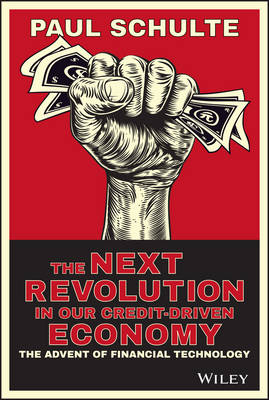
The Next Revolution in our Credit–Driven Economy – The Advent of Financial Technology + WS
John Wiley & Sons Inc (Hersteller)
978-1-119-09124-0 (ISBN)
- Keine Verlagsinformationen verfügbar
- Artikel merken
Go inside the research to see the global consequences of unethical banking The Next Revolution in our Credit-Driven Economy: The Advent of Financial Technology integrates market theory and practice to help investors identify growth opportunities, and to help regulators create a sustainable economic environment. Author Paul Schulte, former economic analyst with the National Security Council, draws upon his own decade-spanning research to demonstrate how unethical banking practices provide the brute force that drives political and economic crises worldwide. By unbundling how credit markets work, this authoritative guide provides deep insight into crisis avoidance and detection, successful investment climates, and the groundwork that must be in place for policy makers to build a sound basis for economic growth. Clear, succinct case studies provide examples of policy and its effects on economic stability, giving you a stronger understanding of the network of forces that determine how loan/deposit ratios behave around the world. Countries that lend more than they save consistently get into trouble, with catastrophic consequences for the rich and middle class as well as the politicians.
This book shows how credit excesses bring about price collapse in stocks, currencies, and real estate, and provides direction for change in the context of global economics. * Dive deep into the mechanisms underlying the credit markets * Learn how unregulated borrowing leads to socioeconomic crises * Examine real-world policy options through global case studies * Discover how credit rises are best detected and avoided An economic climate in which even the smallest hiccup can have long-lasting consequences should be the ideal impetus for a close scrutiny of global banking practices and economic policy. The Next Revolution in our Credit-Driven Economy takes you behind the scenes for a new perspective, and a more informed look at where the world needs to begin changing. The second half of the book will take a look at the revolution driving financial technology. Companies in Silicon Valley and giants like Alibaba are challenging the landscape for banking. This has profound implications for policy makers, banks and for a new class of entrepreneurs who are developing software which is taking away market share from bank and challenging decades-old financial empires.
The book will explore the reasons why many global banks remain flat-footed. It will go into detail about the new companies and software that are moving in the Far East and with innovations in securities, bonds, foreign exchange, retail lending and SME lending. Lastly the book will look at the strategy behind Alibaba and how it will challenge many companies from a powerful base inside China.
PAUL SCHULTE runs Schulte Research, his own financial services consultancy based in Hong Kong where he is a permanent resident. His clients include sovereign wealth funds, hedge funds, mutual funds, pension funds, exchanges, and regulators. His policy experience includes work with the National Security Council at the White House in the 1980s and the Indonesian Ministry of Finance in the early 1990s. He specialized in investment strategy and research in financials with Credit Suisse, Lehman Brothers, Nomura and China Construction Bank Intl. over a 20-year period. In the academic world, he is a Senior Fellow at the Center for Emerging Markets Enterprises at the Fletcher School of Law and Diplomacy at Tufts University in Boston, Massachusetts. He is also a Visiting Scholar in the MBA programs at both Hong Kong University and the Hong Kong University of Science and Technology. In addition, he has lectured at MBA programs at Tsinghua, Fudan, NYU Stern School, FGV (Rio), LBS, UCLA, Loyola Marymount, Northwestern, among others.
Acknowledgments xvii About the Author xix About the Website xxi Introduction: A Few Numbers Can Crack the Code xxiii PART ONE How Bank Credit Drives Economics (Not the Other Way Around) and Why CHAPTER 1 A Few Simple Concepts That Anyone Can Understand 3 CHAPTER 2 Differences between Liquidity and Solvency Are Thin 23 CHAPTER 3 Anatomy of a Credit Crisis and Examples in the Real World 33 PART TWO I Am from the Government, and I Am Here to Help Your Broken Banking System CHAPTER 4 Socialization of Debt after Mismanagement by Bankers (or, Why Keynesian Economics Doesn t Work) 55 CHAPTER 5 Why Capitalist Bankers Create Soviet Banking Models When the Going Gets Rough 75 CHAPTER 6 Central Banks Are Carrying the Greatest Load and Will Dominate Outcomes 89 CHAPTER 7 How Bankers and Policy Rescuers Affect Stocks, Foreign Exchange, and Property 103 PART THREE Interlude CHAPTER 8 Why Government and Institutions Get Suckered into Debt Binges 119 PART FOUR The Revolution in Financial Architecture CHAPTER 9 Why Is This Revolution Happening Now and Why So Fast? 135 CHAPTER 10 The Revolution in Alternative Investments 145 CHAPTER 11 The Revolution in Big Data and SME Lending in the Emerging World 157 CHAPTER 12 Banking and Analytics The PayPal Gang, Palantir versus Alibaba, and Hundsun 177 Appendix 195 Bibliography 197 Index 199
| Erscheint lt. Verlag | 6.7.2015 |
|---|---|
| Verlagsort | New York |
| Sprache | englisch |
| Maße | 150 x 250 mm |
| Gewicht | 666 g |
| Themenwelt | Wirtschaft ► Betriebswirtschaft / Management ► Finanzierung |
| Betriebswirtschaft / Management ► Spezielle Betriebswirtschaftslehre ► Bankbetriebslehre | |
| Wirtschaft ► Volkswirtschaftslehre ► Makroökonomie | |
| ISBN-10 | 1-119-09124-1 / 1119091241 |
| ISBN-13 | 978-1-119-09124-0 / 9781119091240 |
| Zustand | Neuware |
| Haben Sie eine Frage zum Produkt? |